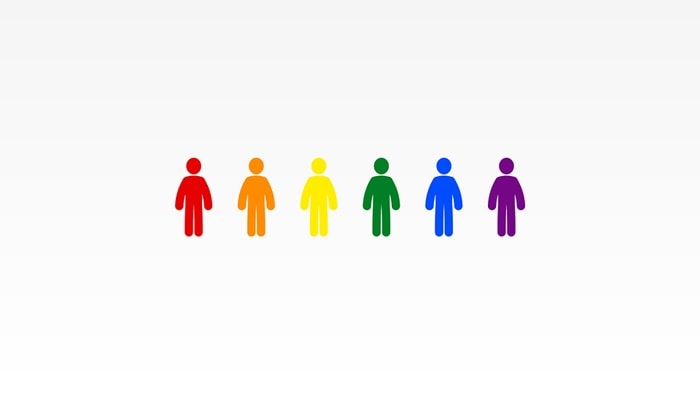By DC Coetsee
In the first article of this series, the parallels between the threat of Christianity in the first century and that of the current attack of Secularism against the entire Christian-Western culture were shown. The most important forms of the assault were dealt with in closing with the LGBTQ+ culture.
Paul’s inspired and inspiring answer to the onslaught at the time was Romans 1:16: “I am not ashamed of the gospel…”. Today’s Christians’ answer cannot be different – also with respect to the LGBTQ+ culture.
A meaningful and responsible evangelical response must meet specific conditions, starting with clear definitions and distinctions.
Ideology and people
Any secular ideology that is directed against the Kingdom of God must be fought and condemned – as is the LGBTQ+ culture (2 Corinthians 10:4-6; Ephesians 2:1-3; 6:12). On the other hand, we must treat people who are trapped in it with love – without hiding the truth (Galatians 6:1-3; Ephesians 4:15; 2 Peter 1:5-7).
In this battle, Christians may not use the same weapons as those of the secular culture, such as physical, verbal and emotional violence (Ephesians 4:29-32) as well as cancellation culture (James 1:19-20; 1 Peter 3:15-17) . The ever-valid will of God must be lived out with love (Matthew 22:37).
Realities, tendencies and emotions
Realities that must always be taken into account are, among other things, that the gender of each person at conception is determined by chromosomes (XX=female, XY=male). Genes or inherited characteristics, the DNA in every cell, hormones for the development and functioning of genitals (estrogen for female persons and testosterone for male persons) remain a reality. All this is according to the sovereign will of the Creator God (Genesis 1:26-28; Psalm 139:13-18) and must be distinguished from tendencies.
Tendencies are preferences for certain actions, thoughts, dealing with realities (Genesis 4:6,7; Romans 7:21-23) which are strengthened or weakened by our choices. Trends are always subject to values. A tendency to angry outbursts, kleptomania, laziness, pedophilia, greed for money and so on are generally condemned and discouraged. However, no one has a claim to general support or acceptance of all trends.
Emotions and feelings are not immutably programmed to be controlled by them.
Selective morality
Sin is sin – there are no small and big (James 2:10-13; 1 John 3:4). Sexual sins are not worse than others and such sinners should not be treated and seen differently than others.
The ultimate reality is “All have sinned and are far from God…” (Romans 3:23) and God’s demand is: “Be holy, because I am holy…” (1 Peter 1:13-16). Selective morality is a man-made construct by which people are unbiblically divided into inferior and superior groups. Jesus makes its unsustainability clear in the parable of the Pharisee and tax collector who goes to pray in Luke 18:9-14 and Paul who confesses in 1 Timothy 1:15-16: “Christ Jesus came into the world to save sinners. Of them I am the greatest. But that is precisely why God was merciful to me.”
The gospel’s answer to the LGBTQ+ culture
There are many sincere Christians who are caught up in homosexuality in its various forms. They have a grueling soul battle about this – and many experience rejection, condemnation, unloving treatment and a fatalistic hopelessness about this from other Christians. Many non-Christians will never seek help from the gospel message because of the violent (physical, emotional, psychological) treatment and attitude they experience – and expect – from Christians.
The evangelical response to the culture and LGBTQ+ people must include the following.
Solidarity and empathy. In their struggles, confusion, unhappiness and fear (and the false secular gospel of “it’s normal”), people who are stuck in the LGBTQ+ culture and seeking help do not need rejection and exclusion. They need someone who comes to stand next to them as a fellow wrestler and sinner, but who has accepted the reality of being a sinner, fled to Jesus Christ as Savior, was born again and lives as redeemed with the power of the Holy Spirit.
They now live free from fatalistic acceptance of their situation, a bad conscience, shame and rebellion – even towards those who remind them of their state of sin and address it. Such people radiate the desire to want to help others experience and experience this miracle.
Second, reality. God determined each person’s sex and gender before birth. There is no such thing as a “gay” gene (according to the latest authoritative research by Ganna and colleagues, published in Science, 30 August 2019). LGBTQ+ people need to be helped to understand and accept these realities. There are many good testimonies of people who have become new people through the renewal of their thinking (Romans 12:1,2) and the acceptance of these realities.
Third, no selective morality. Every person is involved in a fight against sin, it sits deep in our being in many forms. Paul describes his own struggle honestly in Romans 7:18-23 and 2 Corinthians 12:7-10. But we must help each other to deal with it – with a view to the liberation and redemption of these “thorns” that plague us. However, an important condition for this is that we walk the path without prejudice, but with the truth in love, together with each other with the attitude of a fellow pilgrim.
Evidently, this approach requires in-depth knowledge of the victims and their problems and a commitment to each other based on love, truth and solidarity.
- DC Coetsee is a native of the Kalahari. He worked as a missionary for 40 years and is currently engaged in biblical counseling and training.








